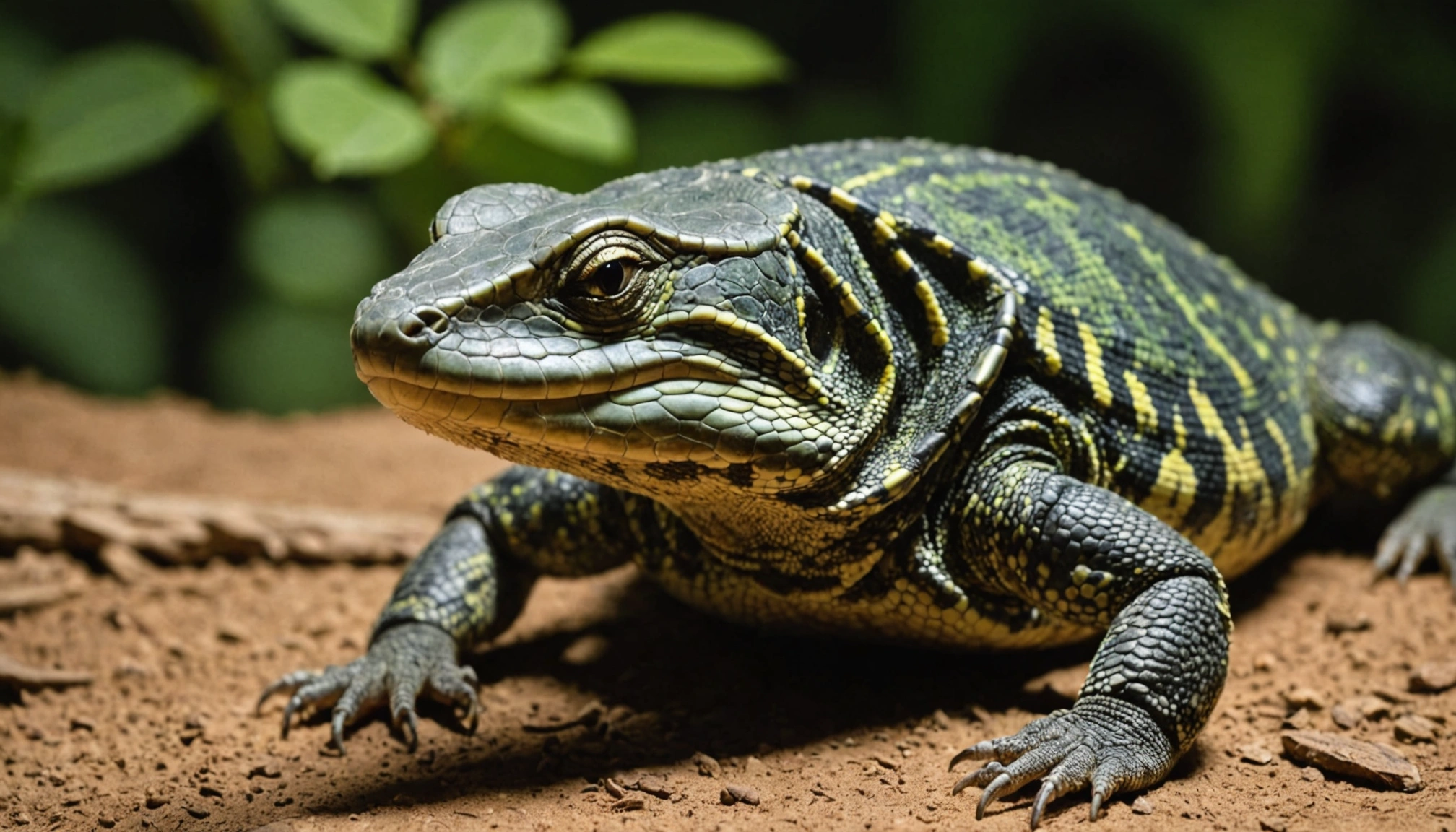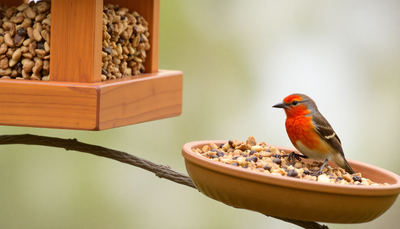
Welcome to the world of species-specific reptile food! As a reptile owner, ensuring that your scaly friend receives the nutrition it needs is crucial for its health and well-being. In this guide, we will delve into the importance of providing reptiles with food tailored to their species' unique requirements. From carnivorous snakes to herbivorous iguanas, each reptile has distinct dietary needs that must be met to support their growth and vitality. By understanding and meeting these specific nutritional requirements, you can help your pet thrive and live a long, healthy life. Join us on a journey to discover the best ways to cater to your reptile companion's dietary demands, whether they slither, crawl, or bask in the sun. Let's explore how species-specific reptile food can play a vital role in keeping your scaly friend happy and healthy!.
Understanding Reptile Dietary Needs
Exploring Reptile Nutrition: A Fundamental Aspect
Reptiles are a diverse group of animals with varying dietary needs. Understanding the nutritional requirements of different reptile species is crucial for their overall health and well-being. Let's delve into the essential aspects of reptile nutrition and dietary needs.
Dietary Requirements of Different Reptile Species
-
Carnivorous Reptiles : Discuss the dietary habits of carnivorous reptiles such as snakes and monitor lizards. Highlight the importance of a protein-rich diet for these species. Mention specific types of prey commonly consumed by carnivorous reptiles and the nutritional benefits they provide.
-
Herbivorous Reptiles : Explore the dietary preferences of herbivorous reptiles like tortoises and iguanas. Emphasize the significance of a high-fiber, plant-based diet in their nutrition. Provide insights into the types of vegetation that are essential for herbivorous reptiles to maintain optimal health.
-
Omnivorous Reptiles : Explain the dietary flexibility of omnivorous reptiles such as bearded dragons and certain turtle species. Touch upon the balance of animal proteins, fruits, and vegetables in their diet. Discuss how the varied diet of omnivorous reptiles reflects their natural feeding behaviors in the wild.
The Role of Nutrition in Reptile Health
-
Vitamins and Minerals : Elaborate on the importance of essential vitamins and minerals in a reptile's diet. Discuss common deficiencies and their impact on reptile health. Provide recommendations on supplementing reptile diets with vitamins and minerals to prevent deficiencies.
-
Hydration : Stress the significance of proper hydration for reptiles. Provide insights into maintaining adequate water sources and hydration levels for different reptile species. Include tips on creating a suitable humidity level within reptile enclosures to support hydration.
-
Gut Health : Highlight the role of gut health in reptile digestion and overall well-being. Discuss dietary factors that contribute to a healthy gut microbiome, such as prebiotics and probiotics. Offer guidance on promoting gut health through proper feeding practices.
Conclusion
Understanding the dietary needs of reptiles is paramount for responsible reptile care. By providing a well-rounded and species-specific diet, reptile owners can ensure the longevity and vitality of their scaly companions. Remember, consulting with a reptile veterinarian or specialist can help tailor a nutrition plan that meets the unique needs of your reptile pet.
Benefits of Species-Specific Reptile Food
Enhanced Nutritional Value
Feeding reptiles food specifically formulated for their species ensures they receive the necessary nutrients for optimal health and development. Each species of reptile has unique dietary requirements, and providing them with food tailored to meet those specific needs can significantly enhance their overall well-being. From essential vitamins to specific minerals, species-specific reptile food is formulated to support the nutritional requirements of each type of reptile, ensuring they thrive in captivity.
Improved Digestibility
Species-specific reptile food is designed to be easily digestible by the particular species, reducing the risk of digestive issues and promoting overall well-being. By matching the food composition to the digestive capabilities of the reptile species, owners can prevent common digestive problems such as impaction or malabsorption. This leads to better nutrient absorption and utilization, supporting the reptile's digestive health and ensuring they maintain a healthy weight.
Behavioral Stimulation
Tailored food options can mimic the reptile's natural diet, encouraging natural foraging behaviors and mental stimulation, which are essential for their overall happiness. Reptiles are instinctive hunters, and offering species-specific food that replicates their natural prey can engage their natural instincts, providing both physical and mental enrichment. This behavioral stimulation can prevent boredom, reduce stress, and promote a more active and healthy lifestyle for pet reptiles.
Longevity and Health
Providing reptiles with species-specific food helps in preventing nutritional deficiencies and related health issues, ultimately contributing to a longer and healthier lifespan. Nutritional imbalances or deficiencies can lead to various health problems in reptiles, affecting their immune system, organ function, and overall vitality. By feeding them a diet tailored to their species, owners can ensure that their reptiles receive all the essential nutrients they need to thrive, promoting longevity and reducing the risk of common health issues.
Customized Diet Plans
Species-specific reptile food allows owners to create customized diet plans based on the specific needs of their reptiles. Whether it's a herbivorous tortoise or a carnivorous snake, having access to a variety of species-specific food options enables owners to provide a well-rounded diet that meets all the nutritional requirements of their pets. This customization not only ensures the reptile's nutritional needs are met but also adds variety to their diet, keeping mealtime interesting and engaging.
Opting for species-specific reptile food offers numerous benefits that can positively impact the health, behavior, and longevity of your reptilian companions. By prioritizing their unique dietary needs and providing them with tailored nutrition, owners can enhance the overall quality of life for their reptiles, fostering a healthier and happier relationship between pets and their caretakers.
Selecting the Right Reptile Food
Providing Proper Nutrition for Your Reptile Friends
Selecting the appropriate food for your reptile is a crucial decision that directly impacts their health and well-being. Each species of reptile has unique dietary needs, so it is essential to choose food that aligns with your pet's specific requirements.
Tailoring Food Choices to Different Reptile Species
Before making any dietary decisions for your reptile, it is important to conduct thorough research on the species-specific food preferences. Reptiles can be herbivores, carnivores, or omnivores, and understanding their natural diet in the wild is key to meeting their nutritional needs in captivity.
Seeking Expert Advice from Veterinarians or Reptile Specialists
To ensure that your reptile's diet is well-balanced and suitable, consulting with a vet or a reptile specialist is highly recommended. These professionals can offer personalized guidance on creating an optimal diet plan based on factors such as your pet's age, size, and health condition.
Key Considerations for Choosing Reptile Food
-
Nutrient Composition : Opt for food that is packed with essential nutrients like calcium, vitamins, and proteins to support your reptile's growth and development. A well-rounded diet is vital for their overall health.
-
Quality Assurance : Choose reputable brands that offer high-quality, fresh food free from any harmful substances. It's vital to inspect the food for freshness and ensure it is free from mold or spoilage.
-
Food Texture and Variety : Consider the texture and form of the food to cater to your reptile's preferences. Some reptiles may prefer live prey, while others might accept frozen or pelletized options. Providing a variety can help maintain their interest in feeding.
Additional Tips for Feeding Success
-
Supplementation : Some reptiles may require additional supplements like calcium or vitamin D3. Consult with a professional to determine if supplementation is necessary for your pet.
-
Hydration : Ensure your reptile has access to clean, fresh water at all times. Proper hydration is essential for their health and digestion.
Conclusion
The right choice of reptile food is vital for promoting the longevity and well-being of your scaly companions. By educating yourself on their dietary needs, seeking expert advice, and offering a varied and nutritious diet, you can ensure that your reptile thrives in captivity.
Homemade Reptile Diets
Offer Tips for Preparing Nutritious Homemade Meals Suitable for Reptiles
- Include a Variety of Protein Sources: Reptiles require protein for growth and energy. Incorporate sources such as insects, lean meats, and eggs into their diet.
- Include Fresh Vegetables and Fruits: Vegetables and fruits provide essential vitamins and minerals. Offer a variety of options such as leafy greens, squash, and berries.
- Consider Calcium and Vitamin Supplements: Some reptiles may require additional calcium or vitamin supplements to meet their nutritional needs.
Discuss Essential Ingredients and Factors to Consider When Preparing Homemade Reptile Food
- Research Your Reptile's Dietary Needs: Different species of reptiles have varying dietary requirements. Make sure to research what foods are suitable for your specific reptile.
- Avoid Toxic Foods: Some foods, such as avocado and rhubarb, can be toxic to reptiles. Be aware of potential hazards and avoid feeding harmful ingredients.
- Maintain Proper Hydration: Reptiles need access to fresh water at all times. Consider moisture-rich foods like fruits to help keep your reptile hydrated.
Importance of Balanced Nutrition
- Understanding the nutritional needs of your reptile is crucial. Ensure a balance of proteins, vitamins, and minerals in their diet to support overall health.
- Monitor Their Health: Regularly assess your reptile's body condition and behavior to make adjustments to their diet if needed.
- Seek Professional Advice: If you are unsure about your reptile's dietary requirements, consult with a veterinarian specializing in exotic pets for tailored recommendations.
Homemade reptile diets offer a personalized approach to feeding your pet reptile. By following the tips and guidelines provided, you can create a varied and nutritious diet that promotes your reptile's well-being and longevity. Enjoy the process of preparing meals for your scaly companion and witness the positive impact of a well-balanced diet on their health and happiness!.
Avoiding Common Feeding Errors
Feeding your pet reptile is a critical aspect of their care. However, many reptile owners unknowingly make common mistakes that can have a significant impact on their pets' health. To ensure that your reptile receives proper nutrition and stays healthy, it is essential to be aware of these common feeding errors and how to avoid them.
Overfeeding: A Weighty Concern
Overfeeding is a prevalent mistake among reptile owners. Providing excess food can lead to obesity, which in turn can cause various health issues for your pet. It is crucial to adhere to feeding guidelines specific to your reptile's species, age, and size. By monitoring portion sizes and feeding frequency, you can prevent overfeeding and maintain your reptile's optimal weight.
Timing is Key: Establishing a Feeding Schedule
Establishing a consistent feeding schedule is vital for your reptile's well-being. While some reptiles require daily meals, others may only need to eat a few times a week. Researching your pet's species-specific dietary needs will help you create a suitable feeding routine. By maintaining a regular schedule, you can promote healthy eating habits and prevent digestive issues.
Embrace Diversity: The Importance of Varied Diets
A lack of variety in diet is another common feeding error. Reptiles need a diverse range of nutrients to thrive. Avoid feeding the same food items repeatedly and incorporate a mix of insects, vegetables, and fruits into their diet. This variety ensures that your pet receives essential vitamins and minerals for overall health.
Supplemental Support: Meeting Additional Nutritional Needs
Certain reptiles require supplements such as calcium and vitamins to supplement their diet. Consult with a veterinarian to determine the appropriate supplements and dosage for your pet. By incorporating these supplements as recommended, you can help prevent deficiencies and support your reptile's optimal health.
Size Matters: Choosing Appropriate Prey
Feeding your reptile insects that are too large can pose a choking hazard or lead to digestive problems. Select prey that is appropriately sized for your pet's species and size. This ensures safe ingestion and prevents potential health complications.
Preparing with Care: Ensuring Nutritional Balance
Properly preparing your pet's food is essential to prevent nutritional imbalances. Ensure that their meals are gut-loaded with nutrients and dusted with supplements before feeding. This practice enhances the nutritional value of their diet and promotes overall well-being.
By avoiding these common feeding errors and taking proactive measures to provide a balanced and nutritious diet, you can safeguard your pet reptile's health and longevity.
Conclusion
Selecting species-specific reptile food is crucial in ensuring that our pet reptiles receive the necessary nutrients for their optimal health and well-being. By understanding the unique dietary requirements of different reptile species and providing them with appropriate food options, we can promote longevity and vitality in our scaly companions. Remember, a well-balanced diet tailored to your reptile's species can make a significant difference in their overall quality of life.






